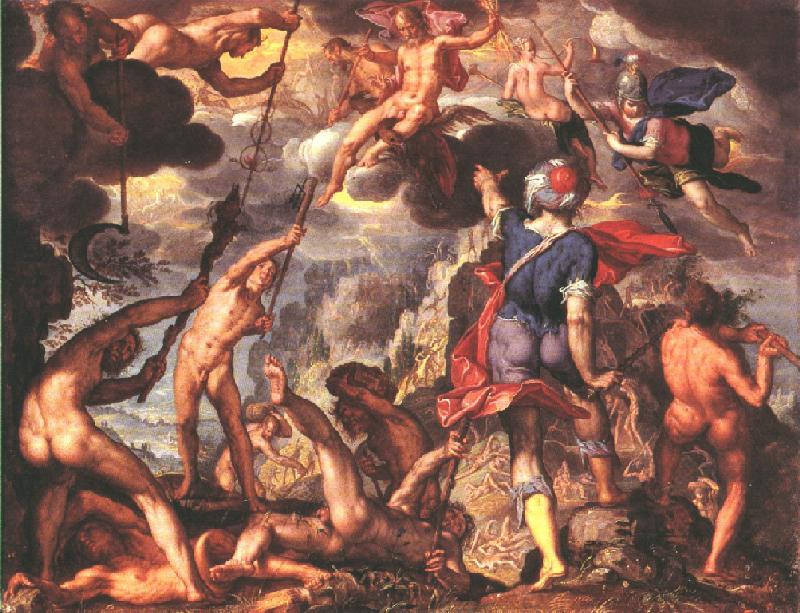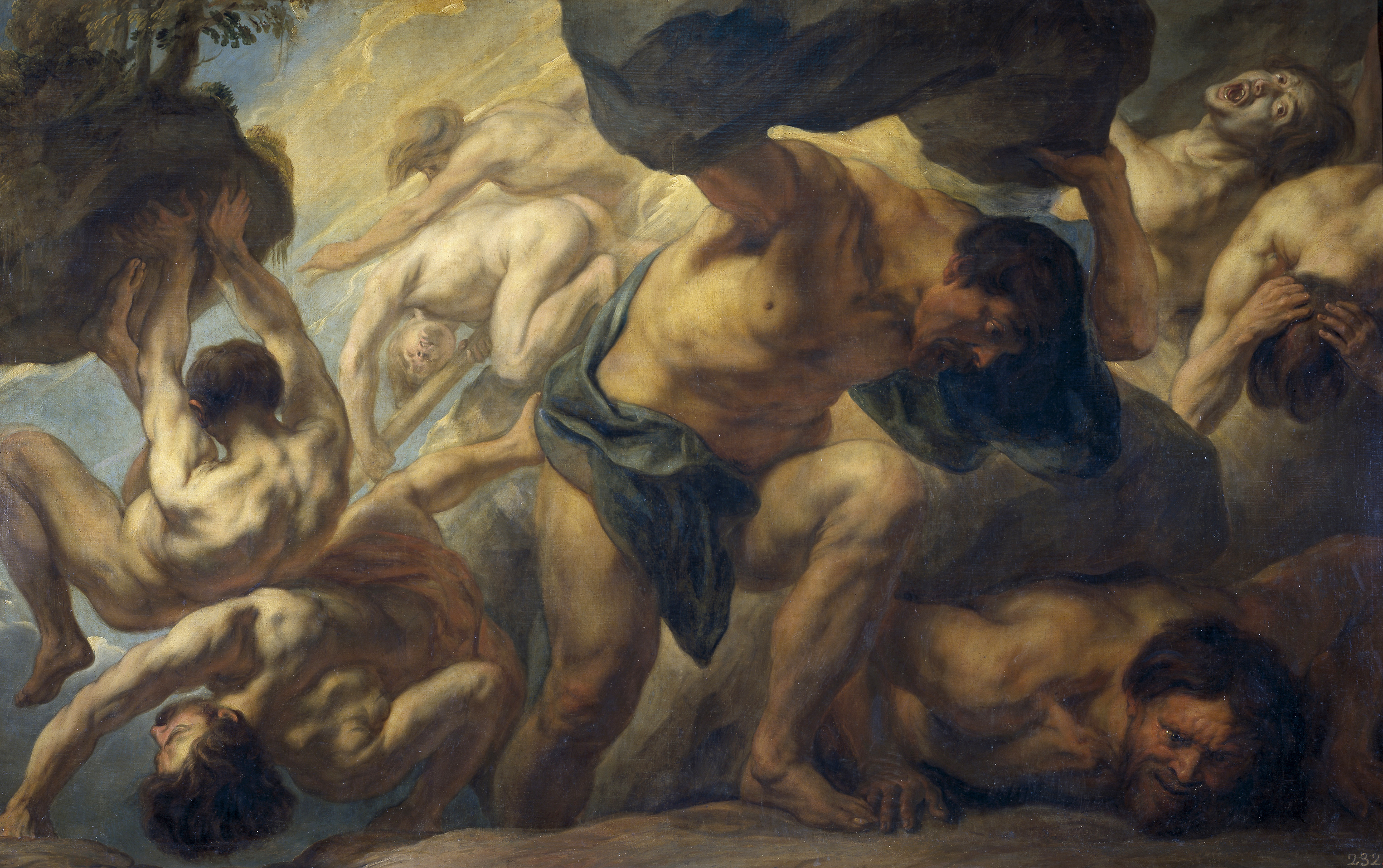The Titanomachy was the great conflict where Zeus and his Olympian siblings waged war against Kronos and his fellow...
The Titanomachy was the great conflict where Zeus and his Olympian siblings waged war against Kronos and his fellow Titans. The war is narrated in Hesiod's Theogony, as well as in a lost epic poem, Titanomachy.
Most agents are probably at least superficially familiar with this Greek myth. Kronos swallows his children to prevent them from challenging his authority. Zeus escapes and frees his siblings from the belly of Kronos. Some Titans, like Prometheus side with Zeus. After a terrible war the Titans were overthrown and imprisoned in Tartarus, below Hades.
I believe that the Titanomachy was actually the struggle between the Shapers and the N'Zeer passing into myth. Crucially a version of the Titanomachy is found again and again in ancient cultures
First, it is important to highlight some interesting parallels between ancient conceptions of the war in heaven and the conflict between the Shapers and N'Zeer. First, there were 12 dominant Titans, also thought of us as Elder gods, who were then supplanted by the Greek gods. The Titans were primordial, elemental, beings of chaos, while the Greek gods were lawgivers and patrons of civilisation and the arts.
Second, the defeated Titans were imprisoned in Tartarus which was considered to be below even Hades. The Titans were locked out of creation itself, it's the closest the ancient Greeks might have been able to come to describing the N'Zeer being locked out of our dimension.
Finally, consider Prometheus. He was one of the Titans who actually sided with Zeus and the new gods. He was a close friend and ally of Zeus until he decided that Zeus was wrong to withhold fire from humans. Prometheus stole fire from Mount Olympus and took it down to earth. Countless classicists have seen the gift of fire as the gift of creative inspiration, of science itself. Zeus was enraged and chained Prometheus to a mountain where his immortal liver was eaten by an eagle everyday. It's easy to see how this could be seen as an attempt by the N'Zeer to share a particular type of knowledge with mankind, something that then saw them defeated by the Shapers, or their servants, and imprisoned away from the world. We know that all explicit references to the N'Zeer were systematically purged throughout history. It is perhaps not surprising that the story passed into myth. Perhaps the Theogony survived because it was more allegorical whereas Thamyris' epic poem, Titanomachy is lost to us because it was less subtle in it's allusions to the real story. Thus, it was expunged by 13MAGNUS and it's fragments are only known by ancient references and quotes.
The really striking fact, is that this Greek myth is not unique. Similar myths exist in a plethora of ancient Eastern and Indo-European civilisations. They all share a key aspect: the overthrow of older gods and/or giants by a new pantheon of younger, more "civilised" gods.
We find this theme repeatedly in the mythological narratives of many cultures.
The Enuma Eliah, the Babylonian creation mythos, tells the story where the storm god Marduk overthrows the older gods and establishes himself as the chief God of Babylon. This epic was recovered in the Library of Ashurbanipal at Nineveh (modern Mosul, Iraq). Many scholars believe the composition of the text dates from 18th to 16th century BCE. These are truly ancient, primal myths, with origins dating from the actual dawn of civilisation in mesopotamia. This myth is found in some form in Assyrian mythology. Also, it's perhaps not surprising that the Romans identified the Babylonian Marduk with Jupiter.
In Hittite mythology we find this story again. The Hittite god Kumarbi overthrows older gods in a Hitte text known as The Kingship of Heaven. The ancient Sumerians and Ugaritians told similar stories but they identified Kumarbi as the god Enlil and El respectively.
The Norse mythological battle between the Asgardians and the Vanir might also be seen as part of this tradition.
Also, the Vedic war between the asura and the deva echoes these themes.
The mythological record could have lots of insights for investigators. I respectively submit this for your consideration.
Edgar Allan Wright Hank Johnson






Most agents are probably at least superficially familiar with this Greek myth. Kronos swallows his children to prevent them from challenging his authority. Zeus escapes and frees his siblings from the belly of Kronos. Some Titans, like Prometheus side with Zeus. After a terrible war the Titans were overthrown and imprisoned in Tartarus, below Hades.
I believe that the Titanomachy was actually the struggle between the Shapers and the N'Zeer passing into myth. Crucially a version of the Titanomachy is found again and again in ancient cultures
First, it is important to highlight some interesting parallels between ancient conceptions of the war in heaven and the conflict between the Shapers and N'Zeer. First, there were 12 dominant Titans, also thought of us as Elder gods, who were then supplanted by the Greek gods. The Titans were primordial, elemental, beings of chaos, while the Greek gods were lawgivers and patrons of civilisation and the arts.
Second, the defeated Titans were imprisoned in Tartarus which was considered to be below even Hades. The Titans were locked out of creation itself, it's the closest the ancient Greeks might have been able to come to describing the N'Zeer being locked out of our dimension.
Finally, consider Prometheus. He was one of the Titans who actually sided with Zeus and the new gods. He was a close friend and ally of Zeus until he decided that Zeus was wrong to withhold fire from humans. Prometheus stole fire from Mount Olympus and took it down to earth. Countless classicists have seen the gift of fire as the gift of creative inspiration, of science itself. Zeus was enraged and chained Prometheus to a mountain where his immortal liver was eaten by an eagle everyday. It's easy to see how this could be seen as an attempt by the N'Zeer to share a particular type of knowledge with mankind, something that then saw them defeated by the Shapers, or their servants, and imprisoned away from the world. We know that all explicit references to the N'Zeer were systematically purged throughout history. It is perhaps not surprising that the story passed into myth. Perhaps the Theogony survived because it was more allegorical whereas Thamyris' epic poem, Titanomachy is lost to us because it was less subtle in it's allusions to the real story. Thus, it was expunged by 13MAGNUS and it's fragments are only known by ancient references and quotes.
The really striking fact, is that this Greek myth is not unique. Similar myths exist in a plethora of ancient Eastern and Indo-European civilisations. They all share a key aspect: the overthrow of older gods and/or giants by a new pantheon of younger, more "civilised" gods.
We find this theme repeatedly in the mythological narratives of many cultures.
The Enuma Eliah, the Babylonian creation mythos, tells the story where the storm god Marduk overthrows the older gods and establishes himself as the chief God of Babylon. This epic was recovered in the Library of Ashurbanipal at Nineveh (modern Mosul, Iraq). Many scholars believe the composition of the text dates from 18th to 16th century BCE. These are truly ancient, primal myths, with origins dating from the actual dawn of civilisation in mesopotamia. This myth is found in some form in Assyrian mythology. Also, it's perhaps not surprising that the Romans identified the Babylonian Marduk with Jupiter.
In Hittite mythology we find this story again. The Hittite god Kumarbi overthrows older gods in a Hitte text known as The Kingship of Heaven. The ancient Sumerians and Ugaritians told similar stories but they identified Kumarbi as the god Enlil and El respectively.
The Norse mythological battle between the Asgardians and the Vanir might also be seen as part of this tradition.
Also, the Vedic war between the asura and the deva echoes these themes.
The mythological record could have lots of insights for investigators. I respectively submit this for your consideration.
Edgar Allan Wright Hank Johnson






Since Norse myth paints the Aegir (Nzeer) in a good light while the Vanir (Shapers?) Are in a more looked down upon view as weak and war haters... Where the Vikings Anti-Magnus?
ReplyDeletePerhaps TrIsten Bordagaray. History is certainly written by the victors. Therefore, given that the N'Zeer were blocked from our world by the Shapers/13Magnus until quite recently, I'm inclined to identity the N'Zeer with the older/Elder gods and Titans. In the case of Norse mythology, that would place the Vanir as the N'Zeer and the Aegir as the Shapers.
ReplyDeleteRemember the Titans were the SECOND generation of gods. Kronos, having led the overthrow of Uranus (Father Sky), was told by his mother Gaia (Mother Earth) that his children would do the same to Him. Thus Kronus swallowed his children in an attempt to prevent this. Of course the Olympians (THIRD generation) survived and defeated the Titans as prophesied. Thus if the Titans represent the N'zeer, and the Olympians the Shapers, what came before?
ReplyDeleteConsidering Prometheus: His gift of fire (creative inspiration) enraged the Olympians because it made humans too much like gods. Much like the serpent in the garden encouraging the consumption of the fruit of the knowledge of good and evil to become as gods. They were driven from the garden before the consumption of the fruit of everlasting life could complete the process. Remember the badge with the serpent and three apples for recruitment?
As for the Aegir and the Vanir: The Aegir (patrons of noble hand to hand combat) conquered and made the Vanir (patrons of magic) behave the way the Aegir wanted.
Heidi Beck Excellent points and thoughts! Uranus and the gods preceding the Titans are often considered "primordial" deities; they are far less anthropomorphic than either the Titans or the Olympians. They tend to represent elemental, primal forces.
ReplyDelete